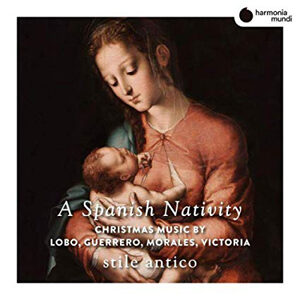I’ve never understood why the powers that control the commercial aspects of holidays have failed to exploit the fact that the Christmas season actually lasts for 12 days beyond December 25th, until January 6, known in the church world as Epiphany (not that I’m complaining). Another 12 days to sell stuff! But for me, it’s 12 much quieter days to listen to the music I was too overwhelmed to listen to before the close of Christmas Day. And that includes this fine disc of “Christmas” music by six 16th-century-ish Spanish composers–and to its credit, there’s actually some Epiphany music here as well.
I put the word Christmas in quotes to signify the fact that for most listeners the music itself–with perhaps two exceptions–will not immediately announce associations with the holiday season or common themes, especially in the manner of today’s carols and popular songs, which for better or worse have a sort of built-in restriction to playing them at other times of year.
The program is a nice mix of great polyphonic motets (Guerrero, Morales, Victoria) and a splendid mass by Alonso Lobo with several examples of the villancico, initially a type of Spanish popular song with roots in early dances that developed during the 15th and 16th centuries into forms both secular and sacred. Later, the villancico became most commonly, almost exclusively, associated with Christmas.
One of these villancicos, one of the above-mentioned “exceptions”, is the lively Ríu ríu chíu, whose irresistible rhythm and catchy tune is the reason for its wide popularity, and, I would argue makes it an easy programming/listening choice no matter what time of year it is. The other exception may be Victoria’s motet O magnum mysterium, which, although its Latin text is definitely about the birth of Christ, also happens to be one of the very greatest and most beautiful Renaissance works, and as such is so well-loved that it’s performed anytime, everywhere, and (often not to its glory) by almost everyone. Not surprisingly, these two pieces appear on many recordings, the majority of them in excellent performances (as is the case here).
So you might rightly conclude that the true attraction of this recording, especially for serious listeners who know and love the music of this time and place, lies in the lesser-known but very worthy repertoire on the rest of the program. No one should be disappointed, particularly regarding the Lobo mass, which is a glorious gem that apparently has only one previous recording. The villancicos enliven and enhance the program, and in every way complement the effects of the more formally expressive pieces. Stile Antico even surprises us by taking it easy, almost prayerfully, in the “Alleluia” transition leading to the ending of Victoria’s O magnum–eschewing the sped-up, rhythmically stressed treatment we usually hear.
It’s true that almost any competent choir can sing the works presented here; but to hear them performed by a professional choir that specializes in music like this–well, there’s no comparison. There’s no accounting for the subtleties, the nuances of phrasing and dynamics, shaping of lines, effects achieved by convergences and divergences of harmony; the magical consequence resulting from mastery of what’s called blend and balance (but can’t really be described); the greater-than-its-parts impact of an ensemble of articulate, well-matched voices, expertly, artfully used. That’s what we expect from Stile Antico, and it’s what we get here: outstanding performances, timeless music. Who wants to wait another, oh, 350 days to hear it again?
































